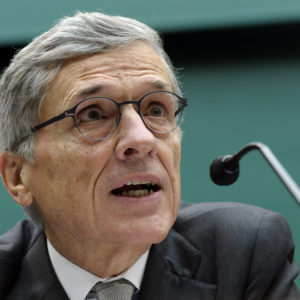The former chief of the Federal Communications Commission under President Barack Obama on Wednesday warned the Trump administration’s plan to repeal net neutrality rules could make accessing the internet like buying a cable TV package.
Tom Wheeler, who led the passage of the embattled rules at the FCC in 2015, said the new Republican plan to undo them would let broadband providers like Comcast and Verizon carve up internet access like premium cable channels.
“Do you want your access to the internet to look like your cable service?” Wheeler told a crowd in Baltimore Wednesday. “Stop and think about it — cable operators pick and choose what channels you get. Cable operators pick and choose who they let on. Cable operators turn to you and say, ‘Oh you want that? That’s going to be a little bit more.'”
The Republican proposal by Wheeler successor and Trump appointee Ajit Pai raises the possibility of repealing core net neutrality rules barring internet providers from web content blocking, throttling, and paid prioritization. Throwing out those rules, especially the latter preventing providers from making deals with popular websites like Netflix to reach subscribers faster than competitors, opens the door for broadband service packages that copy the cable TV model.
Absent regulation, that could transform into broadband subscribers paying more to access premium websites like Netflix, much the way they pay more to get HBO, according to Wheeler.
“That is the difference between a closed network and an open network,” he said.
It isn’t a hypothetical scenario, claims Wheeler. In 2005, before the debate surrounding net neutrality took off, Wheeler recalled how Comcast sought to ban peer-to-peer sharing on its network. In 2013, Verizon told a federal court it opposed net neutrality principles like paid prioritization because it wanted the ability to offer websites like Netflix faster lanes for web traffic in exchange for higher prices than its standard service.
The FCC’s ability to enforce the rules is grounded in Title II of the Communications Act. The law gives the agency tough regulatory powers like price setting over legacy monopoly businesses like telephone carriers, dubbed common carriers. Title II, which Wheeler used to classify internet providers as common carriers subjected to FCC regulation, is the primary target of Pai’s repeal.
He and other Republicans believe the threat of tougher Title II regulations hang over broadband investment like a storm cloud, deterring investors and slowing network growth. According to economists at Stanford, Pepperdine, New York University, and elsewhere, the rules have cost the U.S. economy 700,000 jobs and $35 billion annually in broadband investment.
Wheeler described Title II as the right fit because the internet, for most of its life, has only been available on dial-up service over telephone lines. Going from an analog to a digital platform, he said, doesn’t change network operators’ obligation to keep networks open.
He added it was “baloney” to say “the fact that it’s zeros and ones means that it ought to be treated differently.”
Since the debate reignited in April some of the biggest broadband providers in the U.S. have come out publicly in support of core net neutrality rules against blocking, throttling, and biased paid prioritization. Many argue it’s Title II, not the rules themselves, that they oppose.
“Net neutrality without Title II is net nothing,” Wheeler remarked.
He was joined by pro-net neutrality Democrat Rep. John Sarbanes of Maryland and Jonathan Sallet, former general counsel for the FCC during Wheeler’s tenure and the attorney who successfully defended the rules in court before a federal court in 2015.
In addition to underpinning the rules, Sallet said Title II gives the FCC authority to protect online users’ privacy. Divesting the agency of its Title II authority over internet providers would not only cripple the agency’s ability to enforce net neutrality, he warned, but also leave broadband subscribers’ personal data for sale to the highest targeted advertising bidder.
Pai wants to return both privacy enforcement and regulation of the internet in general to the Federal Trade Commission. The FTC oversaw both under a lighter-touch regulations until the the FCC under Wheeler passed the 2015 Open Internet Order. He followed up the order with tougher new privacy rules for internet providers that barred them collecting sensitive subscriber data, like browsing history, without advance permission. Congressional Republicans have since repealed the privacy rules, and are working instead on passing rules that would apply to edge providers like Facebook and Google too.
On Tuesday, Pai for the first time signaled his preference to let Congress decide the issue of net neutrality via legislation. Some ISPs have indicated support for legislation over a regulatory environment that quickly shifts depending on what party is in the White House. The House of Representatives will hold its first hearing on the issue in September, and has invited the CEOs of leading tech companies and major internet providers to attend.

